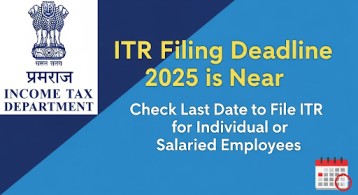Short info: The Central Board of Direct Taxes (CBDT) has extended the last date to file Income Tax Returns (ITR) for Assessment Year 2025-26 (Financial Year 2024-25) from 31 July 2025 to 15 September 2025. This extension mainly helps salaried and other taxpayers who are not subject to audit. If you miss 15 September, you can still file a belated return with penalties until 31 December 2025.
Important Dates
| Event | Date (2025) |
|---|---|
| Original due date | 31 July 2025 |
| Extended due date (non-audit taxpayers) | 15 September 2025 |
| Last date to file belated return (u/s 139(4)) | 31 December 2025 |
| Audit cases (normal due date) | 30 September / 31 October 2025 (check your category) |
The CBDT extension was issued because of major changes in ITR forms and to give time for system readiness. Always confirm specific dates for your tax category on the official Income Tax website.
Who should file by 15 September 2025?
- Salaried individuals whose accounts are not subject to audit.
- Pensioners and most individual taxpayers with income not requiring audit.
- Taxpayers who want to claim refunds or reliefs for FY 2024–25.
If your business/profession requires audit, you must follow the audit deadlines and extended timelines for those categories. Check the Income Tax portal guidance for exact applicability.
Penalty & Interest — What happens if you miss 15 Sept
| Rule | What it means |
|---|---|
| Late fee under Section 234F | Up to ₹5,000 for late filing. If your total taxable income ≤ ₹5 lakh, the fee is capped at ₹1,000. |
| Interest on unpaid tax (Section 234A) | Interest at 1% per month (or part month) on the unpaid tax from the due date until payment. |
| Belated filing window | You can file a belated return under section 139(4) until 31 December 2025, but late fees and interest will apply. |
If you file after 31 December, penalties may be higher and certain benefits (like carry forward of losses in some cases) could be restricted. Consult a tax advisor if you are close to deadlines.
How to File ITR — Simple Steps for Salaried Employees
- Collect documents: Form 16 (from employer), bank statements, interest certificates, TDS certificates, Aadhaar, PAN, and investment proofs.
- Visit the Income Tax e-filing portal: incometax.gov.in.
- Login with your PAN and password (or use Aadhaar OTP / netbanking login if available).
- Choose the correct ITR form (e.g., ITR-1 Sahaj or others applicable) and fill income, deductions and TDS details.
- Verify TDS and tax paid, calculate tax due or refund, submit the return and e-verify it (Aadhaar OTP / netbanking / EVC / sending signed ITR-V to CPC if required).
- Keep the acknowledgement (ITR-V) and e-verification proof safe.
Filing early reduces the risk of portal congestion and helps get refunds faster if you have excess TDS. Use the official utilities if you prefer offline preparation (Excel/Java utilities available on the portal).
Documents You Should Keep Ready
- Form 16 (salary) and Form 16A (TDS on other income)
- Bank statements / interest certificates
- Investment proofs for deductions (Section 80C, 80D, etc.)
- Capital gains statements (if any) and property documents (if applicable)
- Aadhaar, PAN, and bank account details for refunds
Important Links
| Purpose | Link |
|---|---|
| Income Tax e-filing portal | incometax.gov.in |
| CBDT Press Release (extension) | Official PIB / CBDT notice |
| Help: Returns & Forms (who should file which ITR) | Guide for individuals |
Frequently Asked Questions (FAQs)
1. What is the new last date to file ITR for FY 2024-25 (AY 2025-26)?
The CBDT has extended the due date for non-audit taxpayers to 15 September 2025.
2. Can I file after 15 September 2025?
Yes. You can file a belated return under section 139(4) on or before 31 December 2025, but late fees and interest will apply.
3. How much penalty will I pay if I miss 15 Sept?
Late fee under Section 234F can be up to ₹5,000. For taxpayers with taxable income up to ₹5 lakh, the fee is capped at ₹1,000. Also, interest at 1% per month is charged on unpaid tax.
4. Who is not covered by the 15 September extension?
Taxpayers whose accounts must be audited (business/profession audit cases), transfer-pricing cases, and other special categories have different due dates — check the official notice and tax calendar for exact dates.
5. Where should I file my return and get official utilities?
Use the Government of India e-filing portal at incometax.gov.in. The portal also offers Excel/online utilities for different ITR forms.
